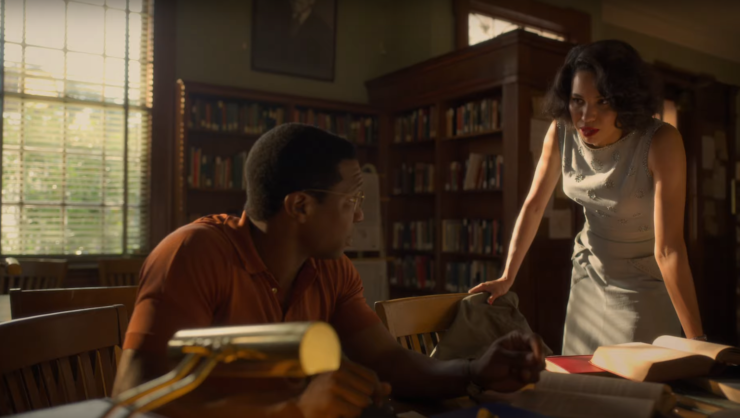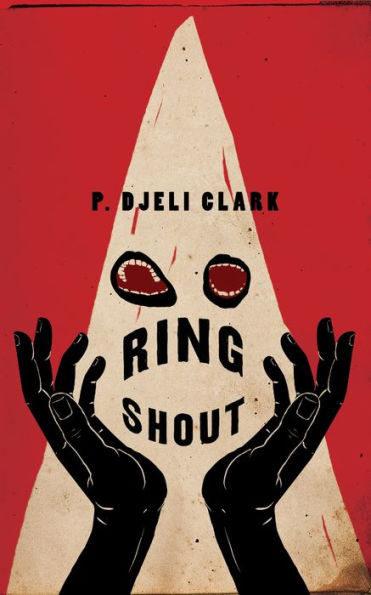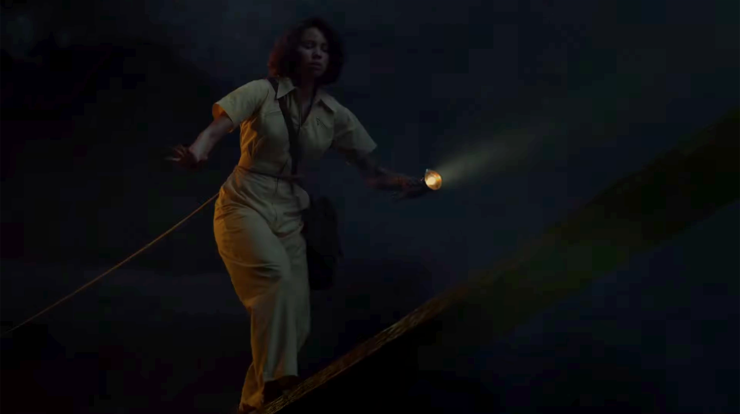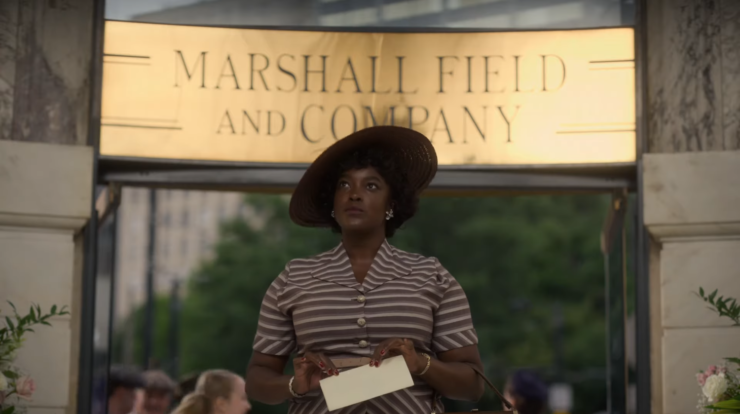Lovecraft Country continues, with the fourth episode blessing us with a classic adventure tale, underestimated women finding unexpected ways to fight back, and a whole lotta family issues.
“If the United States fails to proliferate its stockpile of nuclear bombs the barbaric Soviet Union will wipe out civilized America.” In the grips of a drunken stupor, a newscaster drones on. The line is specifically about the Cold War, but could just as easily be applied to the Freeman family. Like his father, Montrose believes the best defense is a good offense. The only way he knows how to protect him from a world that wants to destroy him is to make him strong and cautious. It’s why he destroys the Order of the Ancient Dawn by-laws George stole from the Braithwaites. If he can contain the threat and block Tic’s access to it, maybe, just maybe he can keep his son alive a little longer. In the background, the train rattles and booms like a growling monster. Ultimately, Montrose can do nothing to stop what’s coming for them.
In fact, discovering grand conspiracies and realizing the people you trust to keep you safe may actually be causing you harm is a running theme in “A History of Violence.” Christina lies to Leti, Leti lies to Ruby, William lies to Ruby, Tic lies to Leti, Montrose lies to Tic, Christina lies to Captain Lancaster, and everyone lies to Hippolyta. Leti, Tic, and Montrose’s lies are meant to protect others, but end up making things worse. Christina is a perpetual scheming machine; I’m sure we’re only scratching the surface of whatever sinister game she’s playing. And while I can only speculate at what William’s up to, he’s most certainly manipulating Ruby on Christina’s behalf.
Over at Leti’s new house, things have calmed down. The ghosts seem to be gone and as more Black families move in, white families are moving out. Christina pops by for another round of threats, but the wards set up by Betsey keep her out. Gotta love it when Black power puts a dent in white supremacy. Her first angle blocked, she tries a different tack by appealing to Leti woman to woman. But there’s nothing equal about a white woman and a Black woman struggling for control. Quietly furious that a Black woman outsmarted her, Christina sneaks in a last minute sucker punch by telling Leti that Tic tried to kill her. It means he also already knew Christina gave Leti the money to buy the Winthrop House, not her late mother.
At the Colored Public Library, Leti tears Tic a new one, first over his failed attempt to kill Christina and then for planning to runaway back to Florida. Tic, realizing that his father had already done all the Braithwaite research, meets with him and Leti at Denmark Vesey’s. Montrose wants his son to stay out of “this Grand Wizardry shit,” but as Leti points out what happens if Tic finds the Book of Names is nowhere near as bad as what happens if Christina does. Yet as much as they need to find the pages of the Book of Names and the orrery, they also don’t recognize how much footwork they’re doing for Christina. Once they get the materials, what’s to stop her from taking them? Is an escalation of arms the best way to fight this particular cold war?

Meanwhile Christina, dressed like a plain, harmless teenage girl, plays with some apple-cheeked North Side white kids until the cops round her up. In a funhouse mirror version of the scene at Denmark Vesey’s, she’s taken to a men’s only club, all polished wood and gleaming brass, where Captain Lancaster has crowned himself king. He sits in a big back room like it’s his personal office, albeit one where someone is literally trapped in a closet. Christina isn’t just playing Tic, she’s playing the Order as well. They think she’s some naive little girl, so she dresses like one instead of the powersuits she wears to intimidate the Freemans. Lancaster makes it clear that it doesn’t matter if she finds the orrery or the stolen pages; she isn’t welcome in his or any of the other 39 lodges. Challenge accepted.
Anyway, it turns out Hippolyta of all people took the orrery. We don’t get much of her in this episode—her story is coming and if it’s anything like the book it’ll be a doozy!—but we get a better sense of how deep the chasm of her grief and frustration really is. All this time she’s watched Tic’s guilt manifest through cleaning and cooking and taking care of Dee and she’s kept silent. She agrees to take Tic, Montrose, and Leti, plus Tree the tagalong, to a Boston history museum in part because she wants to see the planetarium, but mostly I think because it’s an act of power. They need her. For once and in a small way, she is running the show. Until she isn’t and she is once more left behind while others get all the fun.
When it comes to Hippolyta and Leti, Tic and Montrose act just as patriarchal as the Sons of Adam do toward Christina. Leticia Fuckin’ Lewis has saved their asses over and over again. We haven’t seen much of Hippolyta’s power yet, but the way she contemplates the orrery, it’s obvious she’s keeping some serious genius under wraps. How many times do the Freeman men need to learn to not underestimate the Black women in their lives?
Buy the Book


Ring Shout
At the museum in Boston, Tic, Leti, and Montrose set off looking for Titus Braithwaite’s vault. Hippolyta and Dee take in the planetarium where we learn she discovered a comet but the credit and the name went to a pretty white girl. Like Hippolyta, Ruby has spent her life being denied her dreams. All she wants is to work at Marshall Field, but they have already hired a Black woman, one who is stick thin and short. Ruby is devastated, but Tamara is thrilled. Smartly dressed and bursting with poise, Ruby seems like she could be middle class. Tamara is champing at the bit to serve someone like her. Marshall Fields probably doesn’t let her do much with white women, and what she is allowed to do doesn’t come with the same respect her white coworkers get. Ruby drowns her sorrow in booze and the blues and a pair of bright blue eyes. I was curious as to how Misha Green would play this plot. If William is who I think he is, that’s one hell of a twist. (It also begs the question of consent.)
Lovecraft Country does deconstruction of classic fiction narratives so well. The first two episodes brought H.P. Lovecraft to life just to kill him all over again, while the third episode took apart the haunted house trope. “A History of Violence” rips open adventure/explorer stories and digs around in the viscera. Stories of dashing white heroes crashing through wild frontiers to rescue damsels in distress, conquer the savages, and discover hidden treasure are everywhere, and almost all of it is hella racist. Take Tarzan, for example. It was one of the most famous adventure stories of the 20th century, and I’d argue that was mostly because of the baked in racism. Even the beloved Indiana Jones movies are rife with colonialist nostalgia. I remember even as a child being bothered that Indy stole that golden totem from the booby-trapped cave; someone felt it was important enough to protect it with an overly complicated series of traps and puzzles, so leave it alone, dude!
Here, we get the fun of booby-traps and treasure and exploring the unknown but with reality and racism constantly crashing the party. Thing is, you can’t separate out tales of exploration from the brutal colonialism that came with it. Whole continents became playgrounds for rich white dudes who wanted to plant their flags on the bodies of Indigenous people and drag off their natural resources like a dragon hoarding gold. The museum guide claims Horatio Winthrop was “given” artifacts “in exchange for teaching the savage tribes the ways of civilized man,” but in reality, he strip mined cultural resources and enslaved people. Just like every other white explorer.
All this context makes Montrose’s final moment even worse. After everything he saw and heard from Yahima, he executes her anyway. Horatio took everything from Yahima and her people, then Montrose took it all over again. He might not think of himself as bad as Horatio, but his actions say otherwise. Both men made sure that if he couldn’t have the translation, no one else could. They stole Yahima’s choice and consent and did it in the most colonial and patriarchal ways possible.
On the topic of Yahima… I don’t feel good about that Two-Spirit stuff. As I’m not Indigenous, I will leave the detailed discussions to them, but I’ll say this much: exposing a trans or nonbinary/gender nonconforming person’s naked body to cis people as a way to introduce their identity is highly problematic at best; having Montrose ask “What are you?” is worse. On top of that, the term “Two-Spirit” is a relatively recent creation and has its roots in the language spoken by the Ojibwe, a people from Canada and the northern Midwest. Yahima is from “the land of many waters,” or Guiana, South America. There is no way she or the Freemans would use the term “Two-Spirit” as an identifier.
As excellent as Watchmen was, it made some major errors with its Vietnamese representation, and Lovecraft Country fares just as poorly with Two-Spirit rep. Up to this point, the show was doing a killer job ripping open the lies white society perpetuates about explorers and adventurers. With Yahima the show undid its good work by trafficking in the same colonizer tropes it was meant to be pushing back against. I’m frustrated and disappointed in everyone involved.

Cultural texts referenced
- Journey to the Center of the Earth by Jules Verne (published 1864)
- “Chain Gang Blues” by Ma Rainey (1925)
- Denmark Vesey was born enslaved but eventually gained his freedom. In 1822 he helped organize a plan for a slave revolt in Charleston, South Carolina. Another enslaved man ratted the group out before the fighting could commence and he and 36 other men were executed. I highly recommend Blain Roberts and Ethan J. Kytle’s book Denmark Vesey’s Garden.
- Y’all better know who Jesse Owens is, but just in case, he was a four-time gold medal winner at the 1936 Olympics. His career was effectively killed by American anti-Blackness.
- What a clever choice to have to use the white boy cover version of a song originally written and sung by Screamin’ Jay Hawkins. Layers upon layers, y’all.
- This is a bit indirect, but I need to bring up W.E.B. Du Bois’ 1920 short story “The Comet,” a predecessor of Afrofuturism.
Final thoughts
- “Why do you keep cooking up death for the rest of us to eat?”
- “Adam named. Eve fucked. God brought forth Monsters. Monsters devoured. God smites Eve.”
- I couldn’t get a good look at the portrait hanging in the Colored Library, but I think it might be of Edward C. Williams, the first Black librarian in the US. He became the librarian at Western Reserve University in 1894 and later at Howard University.
- It’s so interesting that Denmark Vesey is Montrose’s favorite bar, since I think if he lived back then he would’ve been too worried to join Vesey’s revolution while Tic would’ve been in the planning meetings.
- Uh, who is trapped in Lancaster’s closet?
- More hints that Montrose might not be straight.
- Welp, it took four episodes, but Ruby got her tall skinny papa.
- “Can you stop acting like this is only happening to you!?”
- Did Yahima refer to herself with she/her pronouns, or were those applied by Tic?
- Casting a Latina as Yahima instead of an Indigenous Guianan left a sour taste in my mouth.
- WHAT THE FUCK MONTROSE?!
Alex Brown is a teen services librarian by day, local historian by night, author and writer by passion, and an ace/aro Black woman all the time. Keep up with her on Twitter and Insta, or follow along with her reading adventures on her blog.










